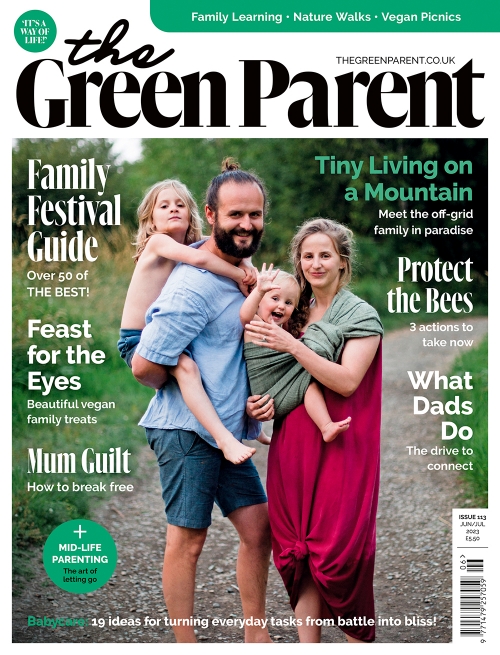Breastfeeding an older baby or child can be a very personal and private experience. Although it continues to play a huge part of a young child’s physical and physiological development, many mothers worry about negative reactions from other people so it is often something that isn’t talked about openly.
To find out more, I conducted a survey of breastfeeding mothers. I asked them about their motivations for and experiences of extended breastfeeding and the kind of support and reactions they got from the people around them. The response was overwhelming, with over 500 women of all ages from around the world keen to share their thoughts and feelings. Little may be said about extended breastfeeding in the baby books, but that clearly does not reflect the passion and strength of feeling among the women who do it.
The first thing to establish was exactly why such a significant minority of mothers continue to breastfeed past babyhood. What is it about this special relationship between mother and child that is so important? We know that breastmilk continues to be an excellent source of nutrition into the second year and beyond but the themes that emerged were about far more than just calories.
Health benefits For Mary Anne, a 48 year old mother of three from Maryland, USA, breastfeeding plays an important role in promoting her family’s health. “All three of my children had health issues at birth,” she explains. “Two were premature and one had major surgery at three months old. In addition, there is a strong family history of allergies on both sides of the family. I believe that breastfeeding kept my children healthier, helped their immune systems and helped prevent allergies.” Helen, 26 from Kent, echoed this, valuing breastmilk for the protective health effects it offered her children. “My family are all dairy intolerant – breastfeeding means I worry less about my children’s health and them developing further allergies or intolerances.”
Providing security
Every family will have their own personal reasons for wanting to extend breastfeeding beyond those first few months, be it a family history of allergies, the nutritional value or maybe religious beliefs. However, one thing that everyone who took part in the survey seemed to share was a sense of wanting to comfort and nurture their children, to do their best for them and provide them with a sense of security and closeness.
This security is particularly valuable if you have children who are highly sensitive, as Mary, 45 from Pennsylvania, discovered with her daughter. “Extended breastfeeding was important to my daughter. She is an intense, sensitive child who relied on the emotional comfort and connectedness of breastfeeding to help her cope with her tumultuous emotions.” Mary valued the extra comfort that breastfeeding offered her daughter and found she naturally stopped asking to nurse when she had developed enough coping skills of her own.
It would seem that a passion for breastfeeding is, for many people, something that grows over time – often a relationship that develops organically rather than something that is planned. As Hazel, 35 from London explains, “Breastfeeding has grown to represent so very much for me. It often feels like a secret amongst a few people of the best way to live, spoken in a language others simply don’t understand till they’ve been there.”
Child led weaning
Rachel, 29 from Minnesota USA, was very glad that she overcame her initial scepticism and gave breastfeeding a go. “I originally didn’t want to breastfeed at all and only tried it because I thought I shouldn’t reject it without experiencing it,” admits Rachel. “It quickly became clear though that breastfeeding was very important to my daughter and once I got through the first month it wasn’t painful any more so it just kind of rolled on from there. Within a few months my ‘plan’ had switched to child-led weaning and that is still what I hope for.”
Dealing with difficulties
Extended breastfeeding isn’t without its problems, although when asked to describe the disadvantages, most mums answered ‘what disadvantages?’ One of the main difficulties faced appears to be dealing with other people’s negative reactions. Many women, like Sue, 35 from Croydon, felt that they always had to justify their choices. “The main disadvantage is other people’s perceptions always being a problem and constantly having to defend or justify extended breastfeeding to other people who think it’s weird.”
Criticism is felt most strongly when it comes from close family or friends but can also hurt from strangers. Lack of support from family can be hard to deal with and, as Gillian, 38, Newcastle found, sometimes rather embarrassing. “I had to deal with negative reactions from my mum and grandma when I fed in a restaurant,” Gillian confesses. “My mum tried to cover me with a napkin!”
Support network
For some women, it was a fundamental lack of understanding and experience that meant family were unable to offer much in the way of support. Yolanda, 36 from County Durham, appreciates that her in-laws do their best, but misses her own family traditions. “I don’t have any family nearby,” she explains. “I come from Latin America/the Caribbean where ‘extended’ breastfeeding is seen as normal by the majority of people. My British in-laws have not been negative about extended breastfeeding but are unable to support me as there is no breastfeeding tradition within the family.”
Most women struggling to gain understanding and acceptance from outsiders could rely on encouragement and compassion from partners, with many respondents naming their other half as their most important source of support. While the majority of women were able to find a sympathetic health visitor or GP, some, like 39 year old Victoria from Rotheram, struggled to access useful information and help. “Emily had low weight gain and I was advised by my health visitor to supplement with formula. I felt happy with her health though and continued to breastfeed exclusively until six months,” declares Victoria “even though the health visitor advised I commence weaning before then.”
Commitment to the cause
Extended breastfeeding takes commitment and determination at the best of times. For Amy, 33 from Massachusetts USA, lack of support from even her partner made it extra challenging and put a significant strain on her relationship. “My husband’s lack of support (he was not breastfed and no one in his family has breastfed kids) from the beginning has been very difficult on our marriage,” admits Amy. “Finding a doctor who doesn’t think I’m crazy has also been hard – GPs seem to think it’s like smoking – ‘you have to cut them off early before they get too hooked’ one actually said to me.”
The other problem area emerging from the surveys was the physical demands that breastfeeding a toddler can put on a woman. Many respondents had experienced exhaustion from months if not years of night feeding and feelings of ‘I want my body back’ were not uncommon. “I struggled with night feeds,” admits Almuth, 36 from Aberdeen “and not feeling I could wean my son even if I chose to. I got very ill and run down, probably from lack of sleep.”
Seeking help
A crucial part of successful extended breastfeeding is being able to access the right kind of support and help. This often comes from a partner, but a strong peer support network is also valuable. These may be accessed through formal breastfeeding support organisations or may occur naturally within an existing group of family or friends. The first hurdle though can be finding other women in similar circumstances, as Canadian mother Megan, 32, has found in her local town. “I have found that there are mothers out there who are still breastfeeding,” she explains “but most are reluctant to talk about it until they find out that I’m still breastfeeding.”
Going to a specialist breastfeeding support group can be a way round this and you know you will be guaranteed to find mums there who are in the same position. La Leche League (LLL) is a popular, well respected organisation in the USA and has groups across the UK as well. LLL is particularly well known for its support of extended breastfeeding and many of its members have breastfed older babies and children. The NCT, BfN and ABM all also offer networks of support across the UK. (see useful information for more details).
For Erica, a 43 year old mother of three from Tennessee, the friends she made through LLL have been a great source of encouragement. “My family has been supportive,” Erica explains “but La Leche League has been awesome. The girls there are understanding and supportive. I’d definitely recommend finding a LLL group that you feel comfortable with.”
Relationship for life
The one thing that was most striking about the survey results was that whatever the age or nationality, all the women who took part have one thing in common – they share a passion for breastfeeding and want everyone to know and understand its significance in their lives. As each day passes, breastfeeding seems to take root, growing into a unique and irreplaceable part of the daily (and nightly!) routine. It entwines itself around the very essence of the family, symbolising a parent’s feelings about love and the way they want to raise their children.
So what final words of wisdom did these mothers have for others in the same boat? Connecticut mum Laura, 42, believes it is just a matter of trusting your instincts. “Breastfeeding and childbirth are confidence games,” she advises. “Just be confident, listen to your body (and the babe), don’t let the doctor, society or anyone else override your instinct to stay quiet and be with the experience.” Linda, 39 from Manchester, agrees. “Extended breastfeeding is what nature intended, if not what society dictates. The calming, loving experience for both mum and baby is one of life’s wonders and should not be missed.”
USEFUL RESOURCES
Association of Breastfeeding Mothers: 08444 121 949
Breastfeeding Network: 0870 900 8787
La Leche League: 0845 120 2918
National Childbirth Trust: 0870 444 8707
Department of Health funded national breastfeeding helpline: 0844 209 0920







